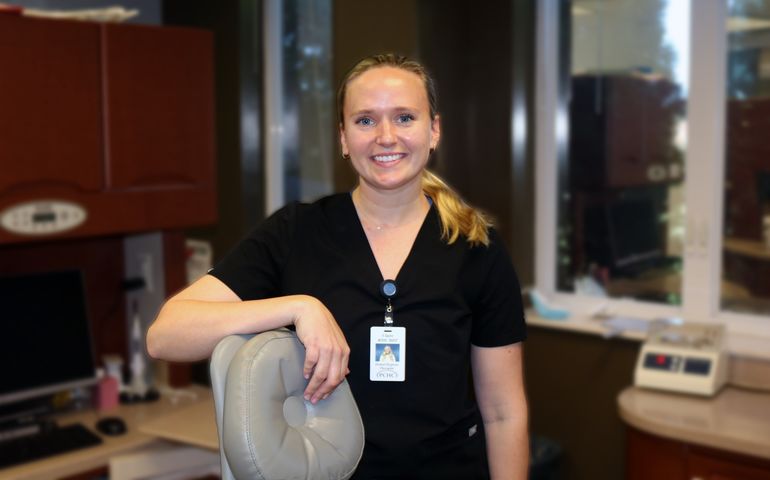East Coast's first dental therapist will practice at Penobscot Community Health
 Courtesy / Penobscot Community Health Care
Claire Roesler was licensed this week as the East Coast's first-ever dental therapist, a position that aims to bring more dental access to rural Maine. She will practice at Penobscot Community Health Care in Bangor.
Courtesy / Penobscot Community Health Care
Claire Roesler was licensed this week as the East Coast's first-ever dental therapist, a position that aims to bring more dental access to rural Maine. She will practice at Penobscot Community Health Care in Bangor.
The East Coast's first dental therapist, a role allowed by a year-old rule change in Maine aimed at bringing dental access to rural areas, has been licensed by the state to practice at Penobscot Community Health Care.
Claire Roesler was approved by the state dental board this week to serve in the position, which has caught on in the Midwest but is new to the East Coast, according to the National Partnership for Dental Therapy.
“This is an exciting and encouraging day for access to oral health in the state of Maine, and in our communities,” said Angela Chase, PCHC dental center’s executive division director, in a news release. “It’s a historic day to celebrate.”
Dental therapists are advanced practice professionals, similar to nurse practitioners or physician assistants, who must have advanced degrees and extra training and perform preventive and basic restorative procedures that were previously reserved for dentists, like filling cavities, doing extractions and placing crowns. They are all services much in demand by the thousands of Mainers served by the PCHC Dental Center, according to the release.
Public health experts say that the addition of dental therapists is crucial in rural states like Maine, where there is a shortage of dental providers.
Vermont, Maine and Connecticut all now have dental therapist laws, but Roesler is the first to to practice anywhere on the East Coast, the NPTD confirmed this morning.
The Maine Board of Dental Practice in April issued final rules to regulate the practice, which were first allowed in a law passed by the Maine Legislature in 2014, and amended in 2016 and 2019. PCHC first announced funding for the position in December 2019.
Roesler joined PCHC last year and has been working as a hygienist while her dental therapy application was pending.
Adequate dental care lacking in much of Maine
“I believe everyone should have access to high-quality dental care,” Roesler said. “I chose PCHC because the mission and vision is based on increasing that access. I wanted to be on the team that delivers patient-centered service to everyone who walks through the door.”
Roesler, who is from the Midwest, earned a master's degree in dental therapy from the University of Minnesota School of Dentistry, as well as a bachelor of science in nutritional science from Iowa State University and bachelor of dental hygiene from Minnesota.
There is no dental therapist training program in Maine. One is expected to open at Vermont Technical College, in Randolph Center, Vt., next year that will offer distance learning and serve Maine as well, the NPTD said.
According to a report by the Pew Charitable Trusts, the state's rural and remote geography, a rapidly aging dental workforce and a lack of dental practices that participate in MaineCare, the state's Medicaid program, make the problem worse. PCHC Dental is among the 15% in the state that do. Of PCHC's more than 65,000 patients in Penobscot, Aroostook, Somerset, Piscataquis and Waldo counties, 70% are seniors or lower-income.
Pew, the 2019 Maine Integrated Youth Health Survey and a federal Centers for Disease Control and Prevention survey from 2018 also found:
- Less than 40% of children on MaineCare saw a dentist in 2018 — the third-lowest percentage in the nation.
- 39% of Maine kindergartners and 45% of third-graders had experienced tooth decay, with almost a quarter of kindergartners and one-fifth of third-graders going untreated for it;
- 65% of adult Mainers in 2018 had a dental visit in the past year;
- Among adults age 65 and over, 18% no longer had any natural teeth;
- 330,000 Mainers — a quarter of the state’s population — live in areas designated by the federal government as having a shortage of dentists, with 15 of the state’s 16 counties are either entirely or partially designated as shortage areas.
- 15% of dentists in the state participate in MaineCare (Maine's Medicaid program).
Roesler's new role was lauded by the NPDT in October, when it was first announced.
“This is a monumental step forward for improving dental care in the United States, as nearly 60 million Americans live in areas without enough dental professionals to meet their needs," said Tera Bianchi, co-chair of the organization.
"Dental therapists are a proven, cost effective way to address the lack of dental care access that has only worsened during the global pandemic. Oral health care is a basic need and regular access not only identifies, but also addresses bigger health issues.”










0 Comments